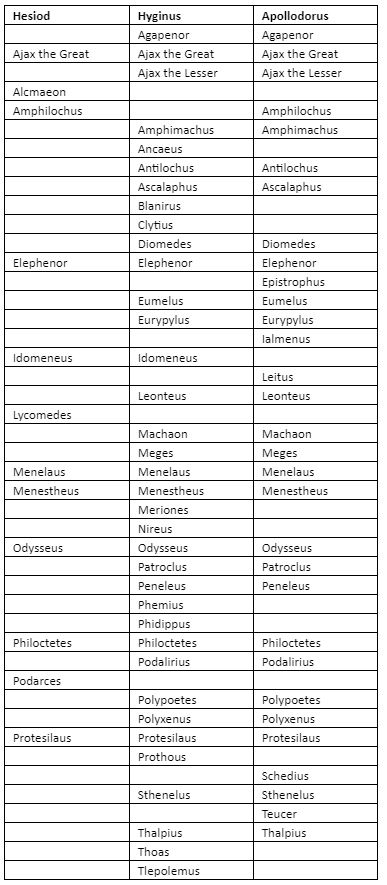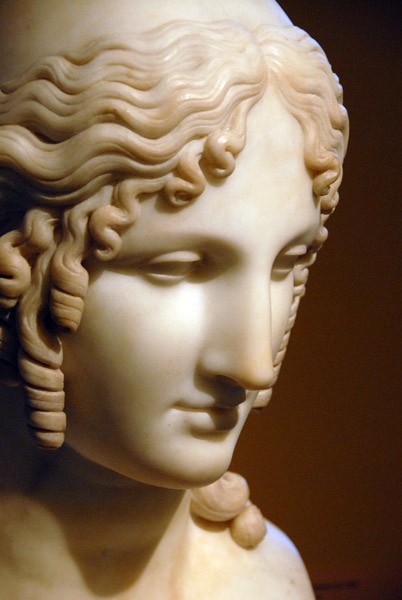The Suitors of Helen
GO TO:
In Greek mythology, the Suitors of Helen are those who came from many kingdoms of Greece to compete for the hand of the Spartan princess Helen, daughter of Zeus and Leda.
Helen of Troy is arguably the most famous woman written about in Greek mythological tales; hers was a face who launched a 1000 ships. The amassing of an armada to bring back Helen from Troy was not just down to Helen’s beauty, but had as much to do with the Oath of Tyndareus taken by the Suitors of Helen prior to her marriage.
Helen abducted when very young
Some affirm that Helen was not a virgin when suitors from the whole of Hellas came asking for her hand. For Theseus, they say, had abducted her years before, fathering a girl Iphigenia, whom Helen handed over to her sister Clytaemnestra when she came back to Sparta, having been rescued by her brothers the Dioscuri, who destroyed the city of Aphidnae in Attica, where Theseus had hidden her.

Helen's beauty
But many others never cared about these rumours, finding this daughter of Zeus who was hatched from an egg to be of unsurpassed beauty. And when because of her, war broke up, some aged wise men found it perfectly understandable that Achaeans and Trojans should slaughter each other for her sake.
For to such an extent may sometimes wisdom submit to beauty. So when it became known that King Tyndareus of Sparta was offering in marriage his stepdaughter Helen, princes and noblemen from the whole of Hellas came to win her hand. Already at this stage it was feared that Helen could cause a war. And when Tyndareus saw the multitude of suitors, he feared that choosing one of them might provoke the others to start quarrelling.
Noticing his plight, Odysseus promised that if the king would help him to win the hand of Tyndareus' niece Penelope, he in return would reveal a way by which all trouble could be avoided. When Tyndareus accepted this bargain, Odysseus told him to exact an oath from all the suitors that they would defend and protect him who was chosen as Helen's husband against any wrong done against him in regard to his marriage.
(List of the Suitors of Helen)

The Oath of Tyndareus
This is how The Oath of Tyndareus came about, the suitors being sworn by the king, and Odysseus receiving Penelope from Icarius, brother of Tyndareus. The ceremony was done in the place later called The Tomb of the Horse on the road from Sparta to Arcadia; for before administrating the oath to the suitors, Tyndareus sacrificed a horse, and after the suitors had been sworn standing upon the pieces of the horse, the animal was buried in the same place.
What was the oath all about?
Odysseus told Tyndareus that the king should extract from each suitor an oath that they would protect and defend whichever Suitor of Helen was chosen. No hero of note would break such an oath, and even if someone did, then they would have to face the force of the other Suitors who were bound to protect Helen's husband.
Helen chooses Menelaus
It is also told that Tyndareus feared that Agamemnon might divorce his daughter Clytaemnestra, and following Odysseus' advice, bound himself by an oath, and gave Helen leave to choose a husband. And she chose Menelaus, putting a wreath on his head.

The oath invoked
Later, when the seducer Paris came to Sparta and abducted Helen taking her to Troy, The Oath of Tyndareus was invoked by her husband Menelaus and his brother Agamemnon in order to form the coalition that sailed against Troy. But The Oath of Tyndareus, through which Odysseus won Penelope, turned against its inventor. For now Odysseus was bound, by the oath he himself had conceived, to go to war.
Furthermore, an oracle had declared that if he sailed to Troy he would be away twenty years, and he would lose everything. So, being reluctant to join the alliance, Odysseus feigned madness, but Palamedes, seeing through the deception, forced him to stop pretending, and go to the war.

Sources
Homer, Iliad
In the Hesiodic Catalogue of Women fr. 198.7–8, and 199.0–1, they are the recipients of the bridal presents. For further details, see A Catalog within a Catalog, 133–135
Hesiod, Catalogs of Women and Eoiae, fr. 196–204; Hyginus, Fables, 81; Pseudo-Apollodorus, Bibliotheca II, 10.8 * Cingano, A Catalog within a Catalog, 124; Clader, Helen, 10
Apollodorus, Library 3.10.8
Aristophanes, Lysistrata.
Cicero, De inventione II.1.1–2
Cypria, fragments 1, 9, and 10.
Dio Chrysostom, Discourses.
Euripides, Helen.
Euripides, Iphigenia in Aulis.
Euripides, Orestes.
Herodotus, Histories, Book II. .
Hesiod, Catalogs of Women and Eoiae.
Homer, Iliad, Book III; Odyssey, Books IV, and XXIII.
Hyginus, Fables.
Isocrates, Helen.
Servius, In Aeneida I.526, XI.262
Lactantius Placidus, Commentarii in Statii Thebaida I.21.
Little Iliad, fragment 13.
Ovid, Heroides, XVI.Paris Helenae.
Pausanias, Description of Greece, Book III.
Pseudo-Apollodorus, Bibliotheca, Book III; Epitome.
Sappho, fragment 16.
Sextus Propertius, Elegies, 3.14.
Theocritus, Idylls, XVIII (The Epithalamium of Helen).
Virgil, Aeneid.
"Greek Mythology Link"













